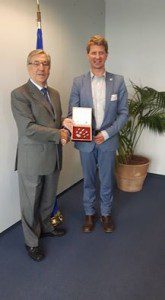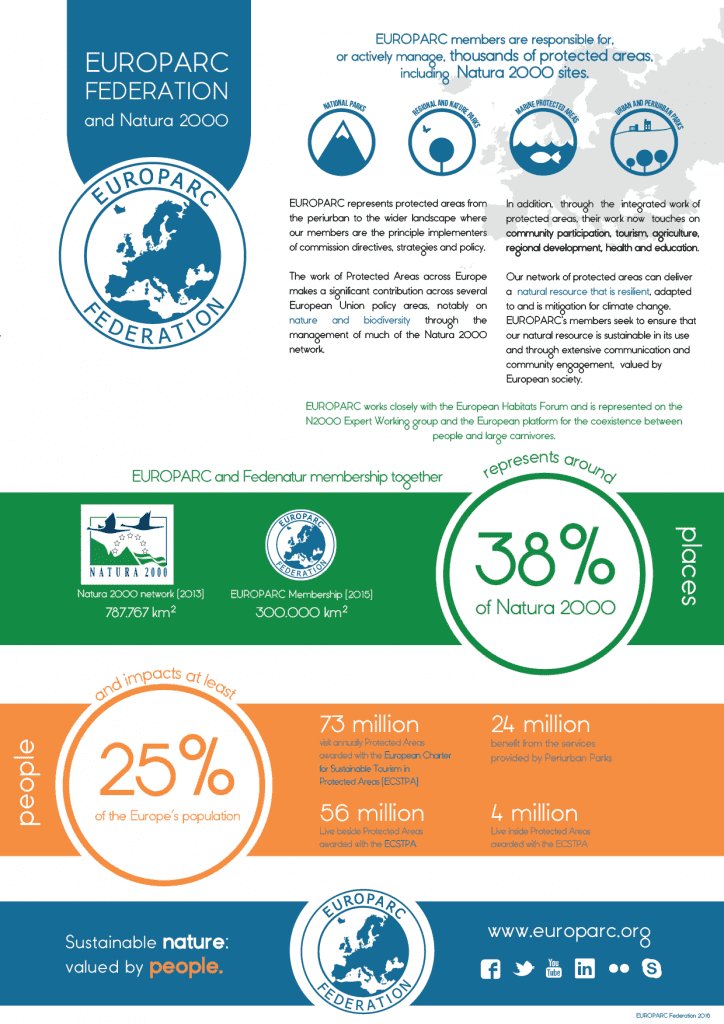Natura 2000 Twinning Workshop
Eurosite - Twinning Workshop, Biogeographical Process 2016
On the 30 November and 1st December, Eurosite is leading the Twinning Workshop, to help design twinning as a tool for sharing good practice in Natura 2000 site management.
The workshop will take place in Rotterdam (The Netherlands), is part of the Natura 2000 Biogeographical Process and is organised by Eurosite and its member organisation Natuurmonumenten.
Twinning is a structured collaboration between people from two natural sites allowing synergies, joint working and learning for the benefit of Europe’s nature. Natura 2000 site managers and the European Commission see an important role for twinning to improve site management practices, however a structure behind the concept is required.
During this twinning workshop, participants will design the (new) Natura 2000 Twinning Framework, taking forward the experiences from Eurosite and other existing twinning programs. This Framework will capture the outcomes and lessons learned from cooperation between Natura 2000 sites and also make them accessible to the wider site management community. By contributing to this workshop, you can make sure that the Natura 2000 Twinning Framework addresses your needs.
Registratuons for the workshop can be done at:
Impact of trees in Cities – Planting Healthy Air Report
Planting Healthy Air Report 2016, by the Nature Conservancy
Trees are essential for human health, no doubt on that, but exactly how much do city citizens benefit from them? And how much investment would be required to achieve meaningful benefits?
The Planting Healthy Air report, made by The Nature Conservancy, shows that even a conservative global investment in urban trees can save tens of thousands of lives.
While trees alone can’t solve the entirety of cities’ air and heat problems, they are a critical piece of the puzzle.
The analysis found that investing just US$4 per resident in each of these cities in tree planting efforts could improve the health of millions of people, and that trees are as cost-effective as many other common solutions.
Most of the cooling and filtering effects created by trees are fairly localized, so densely populated cities—as well as those with higher overall pollution levels—tend to see the highest overall return on investment (ROI) from tree plantings.
The localized nature of trees’ effects, however, means that particular neighborhoods in virtually any city could benefit from plantings. City planners can even target plantings to protect areas with especially vulnerable populations—such as near schools and hospitals—or use trees as a screen against PM coming from highways and industrial areas.
The online report includes case studies a remarkable story map and video clips – Download the report here.
The Voice of Nature at the highest level in the European Commission
EU flags in front of European Commission © www.esomar.org

Mr. Karmenu Vella and Ignace Schops at the European Commission, November 2016
EUROPARC President Ignace Schops and Executive Director Carol Ritchie were yesterday welcomed at the European Commission for an important meeting with the Commissioner for Environment, Maritime Affairs and Fisheries.
Mr. Karmenu Vella acknowledged the important role of EUROPARC has, as the voice of Protected Areas in Europe. EUROPARC members, the guardians of Europe’s biodiversity, are the most important source of information on the implementation of the Birds and Habitats Directives. The Commissioner also considered that Protected areas are at the nexus of many differing agendae, integrating nature conservation and sustainable development across a broad range of societal themes, such as agriculture, health, tourism and community engagement. The Commissioner recognised, the Federation as the broadcaster of important field perspectives providing the feedback that the Commission is looking forward to receive. With the integration of Fedenatur into EUROPARC and the opportunities that bring to reach an even wider spectrum of European society, ensures that relations between EUROPARC and the European Commission are now stronger than ever.
Finding a new language for Protected Areas
The work of EUROPARC members is in the front line of sustainability: it underpins nature conservation but goes further, towards enhancing the economic and social benefits Protected Areas can deliver. This is evident in the EUROPARC strategy 2015-2021 as it seeks to encompass the social and economic dimension of Parks, aiming for a “Sustainable Nature, Valued by People”. EUROPARC brings to the agenda a broader perspective of protected areas in the fields of sustainable agriculture, health, climate change mitigation, transboundary cooperation, sustainable tourism, ecosystem services and much more.
Our meeting was able to highlight this body of work and experience, to the Commissioner. Now, the European Commission is seeking another language for protected areas; an economical language that also highlights the social benefits that can be translated and recognised by other European Institutions, business and the wider society. EUROPARC will be one of the most significant sources of information to get those messages across. Through examples and best practise studies, highlighting the work of our members, the Commission will be looking for opportunities to work with EUROPARC for future action in this field.
Integration, implementation and capacity building
After the recent decision to merge with Fedenatur, EUROPARC is now also closer to urban centres, thus, closer to the majority of European Population. Currently, EUROPARC members are responsible for almost 40% of the Natura 2000 network and affect directly at least 25% of the European population.

Together, members and the Federation will be a stronger player highlighting the value of protected areas and showing that nature conservation has to be integrated in the wider society.
The work of the Federation in providing new tools and training for Natura 2000 managers, such as the Communications Toolkit, was also remarkably noticed by the Commissioner. Supporting parks, bringing people together and offering capacity building opportunities is in the very essence of EUROPARC.
The voice needs words
EUROPARC now has an open dialogue with the European Commission, senior managers from DG Environment and a direct connection to the Commissioner himself. We have better ways to give our members the recognition they deserve. More than ever, we need you – EUROPARC members. We have opened the door – now we need even more feedback from your work in the field!
Yes, we are the voice, but we need your WORDS. Do get in touch with EUROPARC Directorate, disseminate your results and share your thoughts and experiences implementing and integrating European policy. We look forward to receive your information.
Watch also the Welcoming words of Karmenu Vella at EUROPARC Conference 2016.
We Need Money – workshop at EUROPARC Conference 2016
It is less than one week left for the beginning of EUROPARC Conference and, for those of you who couldn’t decide yet if attending or not, we want to introduce you to one of the most interesting topics that we will be covering within our program; fund raising.
Problems finding money? You are not alone…
Money has always been one of the biggest challenges when running an organization, and protected areas are not an exception. Its availability plays a major role in our way to success, and therefore we invest great part of our time and effort in finding money, managing money and trying to make the most of our money.
However, money is becoming increasingly harder to find, so new financing solutions are being explored all around Europe to keep institutions well nourished. For some Protected Areas, this solution resides in forming partnerships with private companies and to establishing good work relationships with corporate sponsors.
But, what kind of sponsorships work for parks? And what ethical considerations should be taken into account when building a relationship with companies that may not be a sustainability model?
Join the workshop “We Need Money”
In order to answer this questions, we want to invite you to join the workshop “We Need Money” at EUROPAR Conference. In it, we will explore what Protected Areas do to find the funding they need, and we will learn from two specific examples from two of our members: Hohe Tauern National Park in Austria, and De Hoge Veluwe National Park in the Netherlands. Likewise, you will have the opportunity to learn and discuss with other attendants about different approachs being taken around Europe.
Places are still open, meet us at Parc Jura Vaudois for this and other exciting workshops. More information at the EUROPARC Conference website.
Join us at EUROPARC Conference 2016!